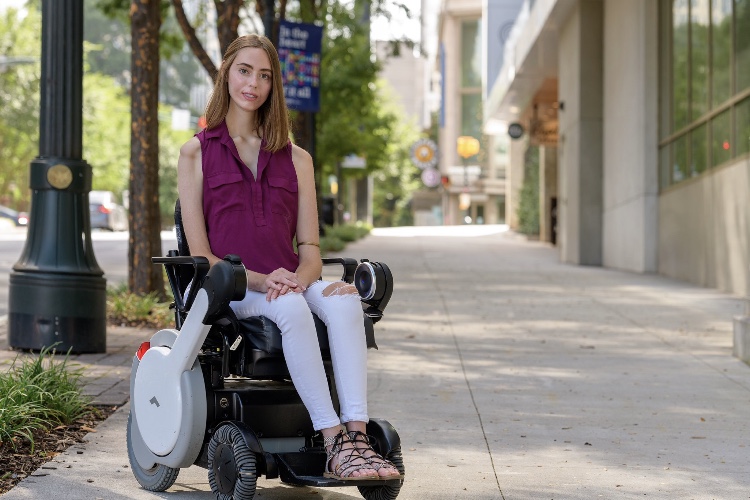photo courtesy of Carden Wyckoff
Meet Carden Wyckoff. She calls herself a wheelchair warrior at six miles per hour. She’s everywhere, advocating for: curb cuts, access-for-all during construction, elevators that work, bike lanes with real protection, restaurants where those in wheelchairs can enjoy time with friends like everyone else, and more. She even traveled all over Europe and the USA via wheelchair (and the entire Georgia section of the Appalachian Trail via piggyback) and brings that lived-and-learned comparative experience to her outreach.
I kept crossing paths with Carden online and quickly started following her (Twitter and Instagram). She’s an extraordinarily effective advocate — maybe even the best in Metro Atlanta right now. It’s no surprise she’s been appointed to various committees and boards (such as the City of Atlanta Accessibility and Inclusion Task Force, for which she was Chairwoman; the MARTA Riders Advisory Committee; and the MARTA Army Board of Directors), and is even consulting on an app named iAccessLife which lets those with disabilities rate and review places using a wide range of accessibility criteria. And considering she’s still in her 20s, her star — and impact — is still rising.
After dropping down Carden’s stunning website and podcast, Free Wheelin’ with Carden, plus reading this January 2020 article about her in Atlanta Magazine, I had the pleasure of interviewing her recently. Here is what I discovered.
Carden is funny, smart, approachable, and extremely open about her lived experience. Her passion is fixing things, which means her career in technical support at Salesforce is a great match. That also means she feels at home trying to fix things in our built environment that specifically do not work for those navigating via wheelchairs — which, by the way, is a relatively new situation for Carden (the last few years).
Carden was diagnosed with a rare form of Muscular Dystrophy, which is a progressive disease. She has pretty much run the gamut of assistive devices — braces on her legs; a scooter; and now a wheelchair she calls her spaceship — since that day as a freshman in high school in a Metro Atlanta suburb when she was out for a run and collapsed, alone, in a cul de sac.
Carden started getting involved with advocacy work out of necessity when she lived in the Lenox area of Atlanta and had difficulty navigating on that scooter due to poor infrastructure. As her disease progressed, she eventually moved to her current home in Midtown, Atlanta, which touts itself as being an Eco-District that is bike and pedestrian-friendly. She cannot, however, access the largest Whole Foods in the southeastern United States (above which she lives) from the private entry for residents because the doors are too heavy and have no button for her to push to open. (She goes outside and enters via a ramp, in all weather conditions, which is often blocked by shareable scooters left astray. Note: she cannot cook and relies on restaurants and stores for food.)
Due to the brisk pace at which Carden travels in her spaceship, she finds it easier to ride in protected bike lanes than on sidewalks (wheelchairs are legally allowed in both*). Many of the supposedly-protected bike lanes aren’t in actuality, however, and this creates grave dangers for her. There are also large gaps in continuity between protected lanes (including on two streets where vulnerable road users were killed over a year ago), and lack of safe access during construction of new ones.
Carden also depends on MARTA trains for transportation and loves that the platforms and trains are seamlessly aligned so she can board at any door on any platform (she has traveled extensively and knows some other cities’ trains are not like this). However, she finds the constant elevator outages have caused her to be unacceptably late for meetings as that forces her to go through a whole time-intensive rigamarole in order to make it to her destination. As for buses, Carden led the metro area recently in a volunteer project to audit bus stops for accessibility. To put it in perspective, I audited about a dozen. Carden audited over 1,000!
As the recent merger between the Atlanta Bicycle Coalition and the pedestrian advocacy group PEDS makes clear, those of us traveling in forms besides motor vehicles have some overlapping issues and our strength is greater when we work together. Also, just because you may not identify as having a mobility disability right now doesn’t mean you or someone you love won’t have a temporary or permanent one in the future, so ensuring a built environment that will accommodate everyone makes sense for all of us.
With that in mind, I asked Carden what those of us Traveling at the Speed of Bike (which for me, at an average seven-miles-per-hour is just one more than Carden’s) could do to be more helpful. Besides making sure we are advocating for everyone (not just people on bikes), she made these specific suggestions:
- If you see something blocking a bike lane, don’t just ride around it. Take a moment to stop and move it, because she often can’t. You can also report blockages (including motor vehicles parked in bike lanes) to Atlanta 311. Carden finds it most effective to report this via Twitter, and has great success with her requests being fulfilled in a timely manner (especially if they are American with Disabilities Act violations).
- If you are approaching someone using a wheelchair head-on, especially if you are riding downhill, please, please, please slow down. Carden indicated this situation is extremely frightening if a person on a bike does not slow down, specifically in the 10th Street cycletrack at the downhill next to Piedmont Park on the way to Monroe.
- Get to know your city councilor. Carden had raves for hers, Councilor Amir Fahroki. (Hang tight — my very next post, coincidentally, is about his stunning participatory budgeting successes, the first three of which involved improved accessibility).
Thank you, Carden, for sharing your lived and learned experience, and for making our metro area more accessible for all.
*Note to all cities: This is one of the reasons NACTO guidelines serve as a minumum standard for when you are creating bike lanes. Too-narrow unprotected bike lanes, which are common throughout Metro Atlanta (including in cities with Bicycle Friendly Community certification) and are currently being built in my suburb-city yet again, exclude people who use mobility devices such as wheelchairs or adaptive cycles. I failed to make a difference in this. Maybe if you think of Carden in those lanes instead . . .
As Metro Atlanta Bicycle Mayor, a League Cycling Instructor, a PeopleForBikes Ambassador, and the author of Traveling at the Speed of Bike (book and blog), I shine a light on people making it more welcoming to ride bikes and access public space close to home and around the world. Meet some more below! If you’d like to put stories to work for your company, municipality, or organization, see here.
Meet Greg Masterson (Metro Atlanta Cycling Club)
Meet Marjon Manitius (Brookhaven Bike Alliance)
Meet Byron Rushing (Atlanta Regional Commission)
Meet Creighton Bryan (Tuskegee Airmen Global Academy)
Meet Betsy Eggers and Jack Honderd (Peachtree Creek Trail and Brookhaven Bike Aliance)
Jon’s Leap of Faith (Street Minister and Bike Saver Extraordinaire)
A Second(er) or Two about Why You’re Needed (City of Dunwoody)
Meet Matt (Painter of New Cycle Track by Mercedes Benz Stadium)
Meet Dr. Walter May (Reinhardt University)
Meet Alex Gee (World Bicycle Relief)
Meet Shawn Deangelo Walton (Everybody Eats ATL and WeCycle)
Meet Charlton Bivins (Clayton County Cycling Club)
Meet Emmett McNair (tour guide extraordinaire)
Meet Mike Fluekiger (Primary Mechanic at Global Spokes)
Thank You, Courtney (NYC’s Peoples’ Bike Mayor)
Meet 31 Women Making the USA More Welcoming for Riding Bikes (the “You Go Girl!’ Series)AdvertisementsAdvertisementsblob:https://travelingatthespeedofbike.wordpress.com/3c2d65f0-ba7a-48b8-a73f-26e7a97f5177

